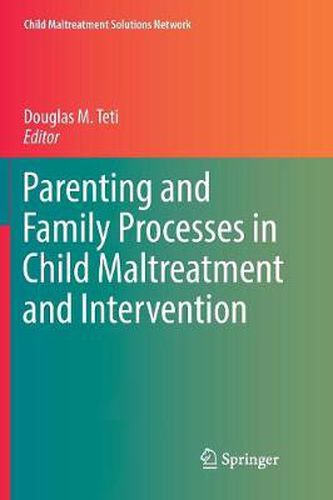Readings Newsletter
Become a Readings Member to make your shopping experience even easier.
Sign in or sign up for free!
You’re not far away from qualifying for FREE standard shipping within Australia
You’ve qualified for FREE standard shipping within Australia
The cart is loading…






This title is printed to order. This book may have been self-published. If so, we cannot guarantee the quality of the content. In the main most books will have gone through the editing process however some may not. We therefore suggest that you be aware of this before ordering this book. If in doubt check either the author or publisher’s details as we are unable to accept any returns unless they are faulty. Please contact us if you have any questions.
This clear-sighted reference offers a transformative new lens for understanding the role of family processes in creating - and stopping - child abuse and neglect. Its integrative perspective emphasizes the interconnectedness of forms of abuse, the diverse mechanisms of family violence, and a child/family-centered, strengths-based approach to working with families. Chapters review evidence-based interventions and also model collaboration between family professionals for effective coordination of treatment and other services. This powerful ecological framework has major implications for improving assessment, treatment, and prevention as well as future research on child maltreatment. Included among the topics:* Creating a safe haven following child maltreatment: the benefits and limits of social support.* Why didn’t you tell? Helping families and children weather the process following a sexual abuse disclosure.* Environments recreated: the unique struggles of children born to abused mothers.* Evidence-based intervention: trauma-focused cognitive behavioral therapy for children and families.* Preventing the intergenerational transmission of child maltreatment through relational interventions.* Reducing the risk of child maltreatment: challenges and opportunities. Professionals and practitioners particularly interested in family processes, child maltreatment, and developmental psychology will find Parenting and Family Processes in Child Maltreatment and Intervention a major step forward in breaking entrenched abuse cycles and keeping families safe.
$9.00 standard shipping within Australia
FREE standard shipping within Australia for orders over $100.00
Express & International shipping calculated at checkout
This title is printed to order. This book may have been self-published. If so, we cannot guarantee the quality of the content. In the main most books will have gone through the editing process however some may not. We therefore suggest that you be aware of this before ordering this book. If in doubt check either the author or publisher’s details as we are unable to accept any returns unless they are faulty. Please contact us if you have any questions.
This clear-sighted reference offers a transformative new lens for understanding the role of family processes in creating - and stopping - child abuse and neglect. Its integrative perspective emphasizes the interconnectedness of forms of abuse, the diverse mechanisms of family violence, and a child/family-centered, strengths-based approach to working with families. Chapters review evidence-based interventions and also model collaboration between family professionals for effective coordination of treatment and other services. This powerful ecological framework has major implications for improving assessment, treatment, and prevention as well as future research on child maltreatment. Included among the topics:* Creating a safe haven following child maltreatment: the benefits and limits of social support.* Why didn’t you tell? Helping families and children weather the process following a sexual abuse disclosure.* Environments recreated: the unique struggles of children born to abused mothers.* Evidence-based intervention: trauma-focused cognitive behavioral therapy for children and families.* Preventing the intergenerational transmission of child maltreatment through relational interventions.* Reducing the risk of child maltreatment: challenges and opportunities. Professionals and practitioners particularly interested in family processes, child maltreatment, and developmental psychology will find Parenting and Family Processes in Child Maltreatment and Intervention a major step forward in breaking entrenched abuse cycles and keeping families safe.